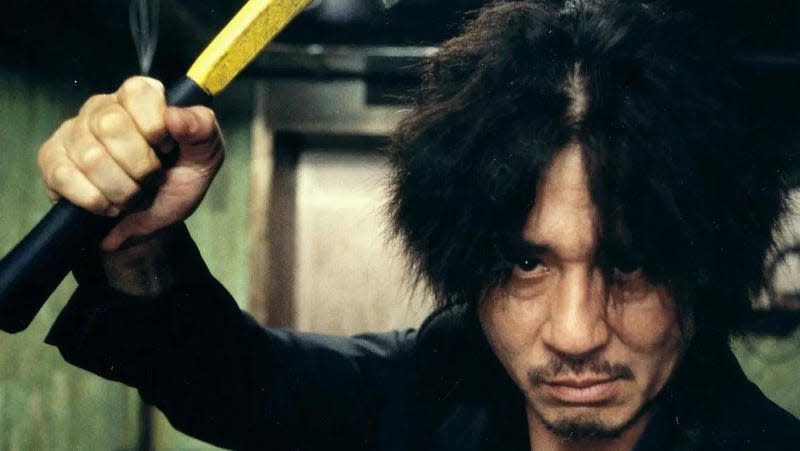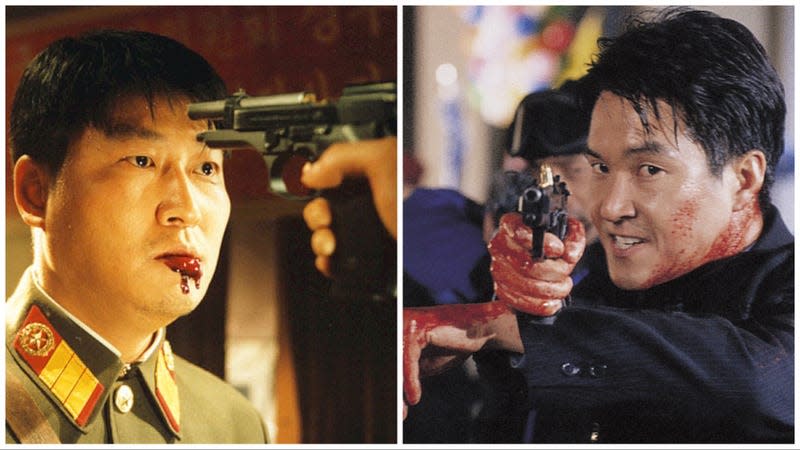Oldboy at 20: The movie that kicked open the door for South Korean films

- Oops!Something went wrong.Please try again later.
- Oops!Something went wrong.Please try again later.
- Oops!Something went wrong.Please try again later.
When Parasite won the Academy Award for Best Picture in 2020, it marked a historic moment for cult favorite filmmaker Bong Joon-ho and for South Korean cinema. While some American audiences were surprised, and even annoyed, to see an international film win Best Picture, many film aficionados knew it was only a matter of time before prestigious Hollywood voting committees started taking more notice of something that had been true for decades: South Korea produces some of the most exciting and audacious films and filmmakers in the world.
And at least in terms of modern Korean cinema, known as the Renaissance era, much of that excitement among American audiences stemmed from Park Chan-wook’s haunting masterwork, Oldboy, which turns 20 this week. You never forget the first time you see Oldboy. For me, it was an international film studies course as an undergrad. I was struck by the way the film defies genre categorization, nimbly moving from comedy to action, to thriller, and horror, with these genres ultimately overlapping.
Read more
While labeled as a revenge story, it feels so much more expansive than that, akin to a modern myth. Park Chan-wook’s film rejected genre classification at a time when American cinema was clinging more tightly to easily quantifiable genres and tones. Simply put, Oldboy wowed me and sent me on a deep dive of discovery through South Korea’s most popular releases, including Park Chan-wook’s Sympathy For Mr. Vengeance (2002) and Lady Vengeance (2005) which, along with Oldboy, formed the Vengeance Trilogy.
Putting South Korean cinema on the map

While Oldboy is certainly one of the most recognizable films in South Korean cinema, the Renaissance period didn’t start there. It started, as so many great film movements across the world have, in response to governmental policies. In 1988 the South Korean government lifted restrictions on the importing of international films, permitting Hollywood movies to be shown theatrically. At the same time, a certain quota of South Korean films was required to play for at least 146 days of the year to prevent the oversaturation of Hollywood films in their country. The policy, following a period of economic recovery after the financial crisis of the ’90s, led to an explosion of homegrown filmmakers, including Park Chan-wook and Bong Joon-ho, who would put their stamp on the South Korean film industry and, later, the world.
Originally, South Korea’s blockbusters followed a similar pattern to the Hollywood hits at the time, focusing on spies and cops and offering up thrilling cat-and-mouse games alongside shootouts. Kang Je-gyu’s slick, action-espionage film Shiri (1999) became the first South Korean blockbuster. Park Chan-wook followed with his third feature Joint Security Area (2000), which became the highest-grossing film in Korean history the following year.
Although South Korea had access to Hollywood films, which made up a minority in terms of distribution, America remained largely unaware of South Korea’s growing industry, though filmmakers Spike Lee and Quentin Tarantino, the latter of whom Bong Joon-ho thanked in his acceptance speech when he won the Best Director Oscar for Parasite, had long championed the country’s films.
But when Oldboy won the Grand Prix at the Cannes Film Festival in 2004, a shift took place. American audiences not only became aware of South Korea’s filmmaking movement, but U.S. distributors recognized there was an untapped market. While South Korean blockbusters still didn’t garner much interest in the States, as that need had already been filled, the country’s horror, thrillers, and genre-bending films took off, filling a need that audiences didn’t even know they wanted. Along with the Vengeance Trilogy, Jee-woon Kim’s A Tale Of Two Sisters (2003), Bong Joon-ho’s Memories Of Murder (2003) and The Host (2006) became popular entries in the Korean cinema canon.
At the same time, Hollywood was finding success in remaking horror hits from Japan following the success of The Ring (2002). This eventually led to a brief period of flirtation where South Korean films received the Hollywood treatment; A Tale Of Two Sisters was remade into The Uninvited (2009) and Spike Lee made his own version of Oldboy (2013). Neither proved successful, but that didn’t hinder the proliferation of South Korean cinema, nor did it stop Hollywood from widening its directorial pool and hiring South Korean filmmakers for English-language films.
Hollywood embraces Korean filmmakers

The 2010s brought a wave of films directed by South Korean filmmakers and starring Hollywood actors, like Park Chan-wook’s Hitchcockian Stoker (2013) and Bong Joon-ho’s post-apocalyptic Snowpiercer (2013) and Okja (2017). As more English-speaking audiences began to familiarize themselves with the filmographies of South Korean directors—with their English-language films being a gateway for many—South Korean films moved beyond the realm of cult DVD curiosities and became popular theatrical and streaming attractions.
Yeon Sang-ho’s zombie film, Train To Busan (2016), Na Hong-jin’s The Wailing (2016), and Lee Chang-dong’s Burning (2018) all contributed to the accessibility of South Korean film, culminating in Parasite (2019) winning the Oscar for Best Picture in 2020. During awards season, Bong Joon-ho spoke often about his hopes that English-speaking audiences would not turn away from foreign language films because of their subtitles and they’d expand their knowledge of cinema by seeking out international titles.
It seems his hopes have been realized, in part, since it was his earlier film, Okja, a Netflix release, that really led to a new wave of international titles on the streamer. Hwang Dong-hyuk’s Squid Game (2021) became Netflix’s most-watched series, leading the streaming giant to invest in more South Korean films and television.
As the writers and actors strikes continue, streamers and studios will undoubtedly be looking to fill their “content” vacuum with international projects. In April this year, it was revealed that Netflix will invest $2.5 billion in South Korean projects, something that seemed unfathomable even a decade ago. We’ve come from Oldboy being an underground hit to South Korean cinema and TV being primed as the life raft of the studio era. As the entertainment industry continues to shift, one thing seems certain—South Korea’s Renaissance era won’t be ending any time soon.
More from The A.V. Club
Sign up for The A.V. Club's Newsletter. For the latest news, Facebook, Twitter and Instagram.

